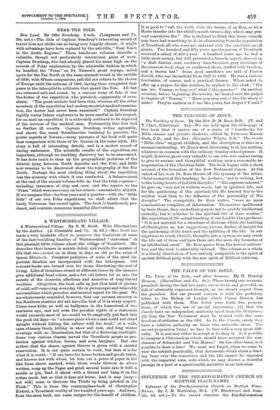A WESTMORELAND VILLAGE.
A Westmoreland Village. By S. H. Scott. With Illustrations by the Author. (A. Constable and Co. 3s. 6d.)—Mrs. Scott has made a very laudable effort to preserve the traditions of some of the fast vanishing families of Westmoreland " statesmen " in this pleasant little volume about the village of Troutbeck. She describes their houses in minute detail, and recalls the manner of • life that was carried on in them in days as old as the reign of Queen Elizabeth. Complete pedigrees of some of the most im- portant families are incorporated with the letterpress. Old acoount-books are turned over for items illustrating the cost of living. Lists of furniture owned at different times by the inmates give additional local colour, and a few old letters let us into the secrets of the domestic affections and anxieties of long-buried worthies. Altogether, the book calls up just that kind of picture of solid, self-respecting everyday life in picturesque and venerable surroundings which provokes sentimental regret for the past. We are wholesomely reminded, however, that our yeomen ancestry in the Northern counties did not have the best of it in every respect. There were kicks as well as halfpence in the homestead of two centuries ago, and not even the peculiar rights of a statesman would reconcile most of us—could we be magically put back into the good old days—to "a house-place where a man could not stand upright without hitting the rafters with his head," or a wide, open chimney freely letting in snow and rain, and long winter evenings with no illumination but that of a flickering rushlight. Some very curious charms served the Troutbeck people as pro- tection against witches, fevers, and even burglars. But one notices that the charm against thieves is given with a mental reservation. It is not quite certain to work, but here it is for what it is worth : "If one have his house broken and goods taken, and knower; not with whom, let him cut a peece of paper in the like form above marked, write those words thereon as above written, wrap up the Paper and prick several holes into it with a needle or pin, bind it about with a thread and hang it on the rotten crook, but Flo that it does not burne, And it may [may— 'not will] come to discover the Thiefe by being pricked in his Flesh." This is from the commonplace-book of Christopher Birkett, a Troutbeck worthy of two hundred years ago. And here, from the same book, are some recipes for the benefit of Children. It is good to "rub the teeth with the brains of an Hen, or let a Horse breathe into the child's mouth twice a day, which may pre- vent convulsive fits." One is inclined to think this horse remedy may have had something to do in eliminating from the population of Troutbeck all who were not endowed with the constitutions of giants. Two hundred and fifty years ago the parson of Troutbeck received a salary of £10 a year. A hundred years ago ho had a little more money, but still presented a homely aspect, dressed in "a drab fustian coat, corduroy knee-breeches, grey stockings of the coarsest wool, clogs or caulkered shoes, stuffed with bracken, and a brown hat." Some good anecdotes are told of Parson Sewell, who was incumbent from 1827 to 1869. Ho was a zealous fox-hunter, of course, and a practical farmer. When asked to offer up a prayer for fine weather, he replied to his clerk : "It's nae use, Tommy, es long es t' wind e this quarter." On another occasion, before beginning the service, he leaned over the pulpit to inquire of " Tommy " : "Have you seen owt o' two lile sheep o' mine? They're smitten in t' ear like yours, but deeper i' t' emit."






















































 Previous page
Previous page